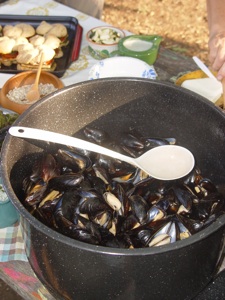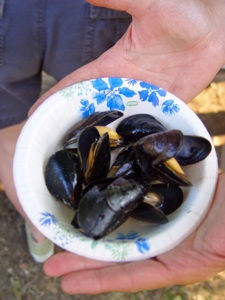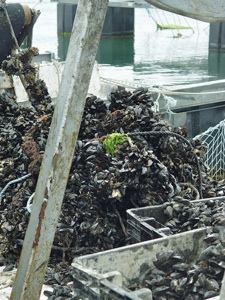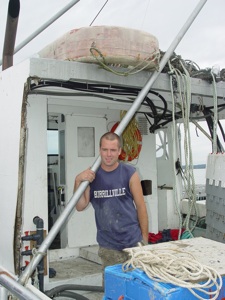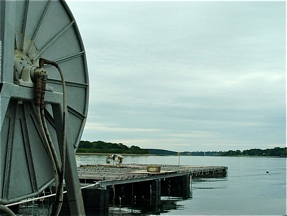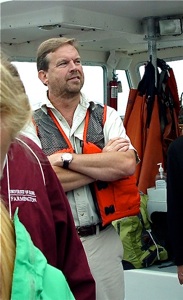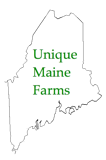Location: Holyoke Wharf
Portland, Maine
Phone: 207-409-3712
Website: www.calendarislandmussels.com
Email:
Products and Services:
-rope-grown mussels
-wild mussels
-hand-graded and hand-packed
mussels in 2 lb, 10 lb, 30 lb bags
immediately placed in ice and then
delivered to consumers/buyers
What Makes Calendar Island Mussel Company So Unique?
Harvesting mussels has played a part in history for thousands of years. The Romans and Greeks enjoyed mussels in ancient times and there has been evidence of mussel consumption in caves near Spain 50,000 years ago. Archaeologists have had a field day exploring the various shell middens along the coast of Maine where piles of the remains of mussel and clam shells were left over a thousand years ago.
Throughout the years, Maine farmers have been experimenting with various methods to grow crops more efficiently. There has been a movement towards more environmentally-conscious farming. While some farmers are navigating towards repurposing crops and introducing alternative farming methods, Peter Stocks is literally and figuratively navigating the Casco Bay to pursue and succeed in operating a mussel farm.
The blue mussels that Stocks and his
company are growing are members of the bivalve family. They are filter-feeders
and their scientific name is Mytilus edulis.
What’s unique and exciting is how mussel farmers, like Peter, are setting up farms where they are actually growing mussels
in addition to just harvesting wild mussels from the water that has been the traditional method in Maine over the years.
The Calendar Island Mussel Company has set up floating rafts where they hang vertically-suspended ropes in the top forty feet of the water. Microscopic mussel seed
attaches to these ropes and after eighteen months, mature, plump mussels are ready to be harvested.
Specially-designed equipment enables the mature mussels to be separated from the ropes when the meat is full and ready for consumption. There is equipment that
lifts the roped mussels on to a conveyor belt, and equipment to strip the mussels and a machine that washes the mussels.
There is a high demand for fresh mussels
that are found in salt water. Peter and his wife Lynda established the Calendar Island Mussel Company to “raise sweet, succulent rope-grown blue mussels in the deep, clear ocean waters of Maine.” Peter explained how significant it is to be able to label his product as Maine-grown because of Maine’s reputation for its cold, deep, pristine waters and its fame for producing quality fresh and tasty seafood.
If you have access to sail around Casco Bay in the waters off of Little Chebeague
Island you may have noticed the rafts that
Stocks owns. If Stocks or one of his employers are not around the rafts, one could easily sail by the mussel farm on route between Falmouth and Chebeague Island without taking much notice.
When a group of teachers from the Maine
Agriculture in the Classroom Summer Institute planned a July 26, 2012, outing to learn about mussel farming and rode out on the “Lucky Catch” to the rafts where Stocks and two of his employees were working, the operation proved to be a fascinating, dynamic example of aquaculture at its best.
Although Peter joked about how he and his two helpers scurried around the boat
to wash off and clean up with a hose when they saw the boat of teachers heading towards them, they couldn’t conceal the fact that harvesting mussels is a physically challenging job that involves getting extremely dirty. The mussels have byssal threads which consist of muds, silt, shells, and vegetative fragments. With this thread the mussel attaches itself to docks, rocks, ropes, and the sea bottom. The thread is incredibly strong and has been applied to various applications when a bonding agent is needed. Before the mussels are washed and this thread is removed, they are just covered with materials that makes it impossible to keep your clothes clean.
Peter Stocks and other mussel farmers
are true pioneers in the aquaculture world.
Once you spend some time talking with a mussel farmer you realize that their
investment of time and efforts is matched
by an extraordinary amount of financial
investment. Money is needed for the permits, boat, fuel, rafts, insulated containers, and expensive specialized equipment. Nets must be purchased to surround the rafts so that eider ducks and other predatory seabirds are prevented from consuming the mussels.
Many variables come into play when a mussel farmer explores a possible location. The quality of the water, the availability of food for the mussels, whether the site will prove to be a hindrance to others navigating the waters, and the effect of tides and water flow and ice drifts all need to be considered.
Peter’s background as a corporate lawyer
must certainly have come in handy when he needed to apply for a ten-year lease for the water space from the Maine Department of Marine Resources. Approval had to be acquired from the U.S. Coast Guard. According to the Maine Aquaculture Association, Maine’s water farmers are actually monitored and regulated by up to seventeen state, regional, and federal authorities.
There were several public hearings on Long Island with the fishermen, Board of Selectmen, and Harbormaster before Peter established his mussel farm. Stocks explained how he met with area fishermen to work towards smooth relations before installing the rafts in October 2010.
The mussels that Calendar Island Mussel Company grows are in demand at restaurants, grocery stores, and fish and farmer’s markets. Mussels receive high marks for being low in cholesterol, calories, and saturated fats. They are prized for their richness in manganese, iron, zinc, and vitamins C and B12. The American Heart Association encourages the consumption of Omega 3 fatty acids to reduce the risk of heart attacks, and mussels contain high levels of Omega 3
fatty acids.
If you are interested in some recipes for mussels, several can be found on the Calendar Island Mussel Company’s website. There are instructions on how to steam and cream mussels. The ingredients and directions necessary to make spicy mussel cocktail, cawdel of muskels, steamed mussels with celery leaves., Mussels Newburg, Mussels Creole, stuffed mushrooms, batter-fried tidbits, and Singapore Pupus, are also found on their website.
Peter and Lynda are proud of their efforts
to be environmentally conscious farmers.
They do not feed or medicate the mussels that they grow. The mussels grow in a natural environment and appear to have
a low impact on any risk of disease, pollution, and effects on the environment.
Peter discussed how they hope to be running their 43-foot harvesting boat and
processing equipment on bio-fuels in the near future.
The Calendar Island Mussel Company is a member of the Maine Aquaculture Association. Sebastian Belle is the Executive Director of this Association. He accompanied the group of teachers who attended the Maine Agriculture in the Classroom field trip to Peter’s mussel farm
on July 26, 2012.
Belle explained to the teachers how only fifteen percent of the seafood consumed in the United States actually originates in our country. Half of the 85% of seafood that is imported from other countries is raised on farms. Most of the mussels presently imported into the United States originate in the Canadian Maritimes.
It didn’t take too long for the teachers in the visiting group to realize the potential for mussel farming and aquaculture in the United States. Stocks spoke about how there could be well-paying jobs when mussel farming becomes more established.
Perhaps one of the most exciting aspects
of mussel farming is to see some of the
repurposed uses that might come about for
the by-products of the industry. Peter discussed how some of the byssal thread is
being used for pharmaceutical purposes
and tough waterproof adhesives.
Lanie Frisbee Buskin, one of the teachers
in the visiting group, commented on the
tour to Stocks’ mussel farm on their
Facebook page: “I was fortunate to take
the teacher’s summer institute program to
learn how to introduce Maine agriculture in the classroom. I want to thank you for the great tour, talk, and to see firsthand the importance of Maine agriculture. We all loved it.”






